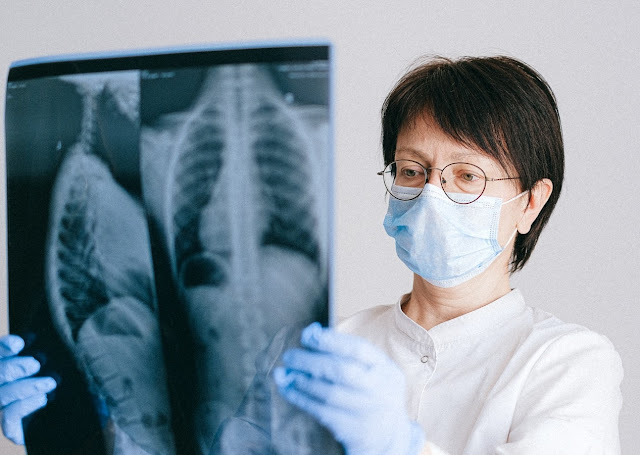Research - Celiac Disease and the Thyroid
 |
| Credit: Freepik by @creativeart |
Here is a research roundup that shows some of the connections between Celiac Disease and the Thyroid. I'm not a doctor, or even a researcher. However, I am capable of reading research and mostly understanding it, due to my background. Clinical practice is often far behind science, and the ways the practice changes can sometimes be arbitrary. One change may require only a few studies, others will require 30 or more studies with thousands of participants, and multiple meta-reviews all reaching the same conclusion.
Well some people, especially newly diagnosed Celiacs who are elderly, may not have time to wait. Knowing the science can help people ask their doctor the right questions and lead them to the right treatment faster. I was told to come back later, when I was sicker so many times, that I took science into my own hands and started leading my own treatment. And it helped a lot! Maybe some of these insights will help you find some good new questions to ask next time you're talking with a medical practitioner.
*======== 1 =========*
Gluten-free diet and autoimmune thyroiditis in patients with celiac disease. A prospective controlled study.
This study, done in 2011) comes from Finland, recognized today as the place that has both the highest prevalence of Celiac and the best environment for finding Gluten Free food. Quote:CONCLUSIONS: Celiac patients had an increased risk of thyroid autoimmune disorders. A gluten-free diet seemed not to prevent the progression of autoimmune process during a follow-up of 1 year.Thyroid autoimmune disorders usually means Hashimodo's Thyroiditis, not just a general hypothyroid condition. In the strictest sense, it means only that the gluten free diet (GFD) only stops the immune system from attacking the gut, it doesn't stop the damage to the thyroid *IF and only IF* the type of thyroid disease is autoimmune (such as Hashi). It doesn't prove anything about regular hypothyroid conditions such as lack of iodine perhaps.
*======== 2 =========*
Tissue transglutaminase antibodies in individuals with celiac disease bind to thyroid follicles and extracellular matrix and may contribute to thyroid dysfunction.
This study done in 2008 is an old one but a good one from Columbia University in NY. Quote:BACKGROUND: Individuals with active celiac disease (CD+) have an increased incidence of thyroid dysfunction, which improves on a gluten-free diet (CD-). We investigated whether tissue transglutaminase-2 IgA antibodies (anti-TGase II) present in sera of patients with celiac disease react with thyroid tissue and possibly contribute to thyroid disease.So in this case, the GFD does actually seem to help the thyroid to recover and they're trying to find out why by looking at the antibodies formed in Celiac Disease (CD) and whether they can bind to thyroid tissues.
CONCLUSIONS: Anti-TGase II antibodies bind to TGase II in thyroid tissue, and titers correlate with TPO antibody titers. These findings suggest that anti-TGase II antibodies could contribute to the development of thyroid disease in celiac disease.So the answer is yes, the antibodies produced that cause the small intestine damage in CD, also disrupt the thyroid's function. This has many implications. First, for men, usually they have mild or no symptoms of CD, but you can see it if they become obese and their thyroid is slow. It's not just because they're too lazy to exercise. Symptoms of thyroid illness in men can be as vague as depression. Testosterone does a great job hiding inflammatory conditions. Another implication, is that active T3 is made in the gut. I'm living proof that you can give some people all the Armor Thyroid in the world, and it won't help them until you give them Liothyronine (active T3), if they have Celiac.
Even the phrase 'if they have Celiac' is vague. We don't know if it's enough to have the genetics, it seems to be enough. Maybe the 'activation' of Celiac is just a move from low-grade reaction to active reaction. How much antibody is enough to hurt the thyroid? We don't really know. I know two Functional Medicine MD's who say that only active T3 should ever e given. Functional MD's are Medical Doctors who've chosen to refuse to contract with insurance companies because it ties their hands as doctors. I'm with them on this one, I didn't make any progress with thyroid until I was switched to Lio.
The take-away from this article is, the antibodies that attack the small intestine in Celiac also attack parts of the thyroid and add to the chaos. Note that we're not talking about Hashi hypothyroid in this case, that would be different antibodies. This is Celiac antibodies acting on the thyroid directly.
*======== 3 =========*
Review and practice guidelines for celiac disease in 2014.
This is in a Postgrad Journal, designed to guide new doctors to the latest research and agreed upon best practices. The country of publication is the US, in TX. Here's the scary part:The treatment for celiac disease is lifelong adherence to a gluten-free diet (GFD). Despite the proven benefits of the GFD, it can be exceedingly difficult to completely avoid gluten-containing foods, and adherence to a GFD is estimated to be only 45% to 80%.I consider myself very strict about avoiding gluten. My adherence is probably close or at 80% though. That last 20% is probably unavoidable, according to this article. This is not good news for my thyroid. And nobody has said that we know every enzyme and antibody that contributes to both Celiac and Thyroid illness. I think it's important to be strict because there is so much unavoidable contact with gluten already.
*======== 4 =========*
[Metabolic disorders and nutritional status in autoimmune thyroid diseases].
In this article, metabolic disorders are pulled together so their interactions can be seen. The article is from Poland in 2015.Malnutrition or the presence of numerous nutritional deficiencies in a patient's body can be the cause of thyroid disorders. Coexisting deficiencies of such elements as iodine, iron, selenium and zinc may impair the function of the thyroid gland. Other nutrient deficiencies usually observed in patients suffering from ATD are: protein deficiencies, vitamin deficiencies (A, C, B6, B5, B1) and mineral deficiencies (phosphorus, magnesium, potassium, sodium, chromium). Proper diet helps to reduce the symptoms of the disease, maintains a healthy weight and prevents the occurrence of malnutritionCeliac disease causes malnutrition, even protein malnutrition. How much money would you have, if you got a dollar for every time someone said it's ridiculous to worry about not getting enough protein in a first world country? Not to mention the also false statement that all vitamins do is give you expensive pee. Notice chromium on that list? Various forms of chromium, especially chromium picolinate, have been shown to stop cravings for carbohydrate foods in some people (with a dose at least in the 600mg range). Other articles have pointed out that obesity with metabolic disorder can be described as the body thinking that it's starving, even though there is plenty, and even too much food.
So that's how you can get from obesity to a high suspicion of Celiac, via hypothyroid diagnosis (in this article they're talking about Hashimodo's Autoimmune Hypothyroid or Grave's disease. There is also a very tiny chance that a bad reaction to an immunization (vaccine) can trigger Grave's disease in some people, but research on that is incredibly controversial. More to the point, the classic scenario of the extremely thin Celiac patient may be just one of two possible presentations.
*======== 5 =========*
Prevalence of Celiac Disease in Patients with Autoimmune Thyroid Disease: A Meta-Analysis.
Here is an article re-analyzing and number crunching many other studies to look for enlightening patterns. It's a collaboration between Sweden, UK, and the USA, published in 2016.RESULTS: A pooled analysis, based on 6024 ATD patients, found a prevalence of biopsy-confirmed CD of 1.6% [confidence interval (CI) 1.3-1.9%]. Heterogeneity was large (I(2) = 70.7%). The prevalence was higher in children with ATD (6.2% [CI 4.0-8.4%]) than it was in adults (2.7%) or in studies examining both adults and children (1.0%). CD was also more prevalent in hyperthyroidism (2.6% [CI 0.7-4.4%]) than it was in hypothyroidism (1.4% [CI 1.0-1.9%]).
CONCLUSIONS: About 1/62 patients with ATD have biopsy-verified CD. It is argued that patients with ATD should be screened for CD, given this increased prevalence.This time I had to include the technical parts. ATD is Autoimmune Thyroid Disease, CD is Celiac Disease. CI is a statistical calculation called 'confidence interval' you can think of it as a margin of error. The interesting bit is that hyperthyroid conditions can also be present with CD, and in fact it's more common to have hyper-thyroid than hypo-thyroid with CD. This effect is even stronger in children. A child with autoimmune thyroid illness, in my opinion, has a critical need for a Celiac screening, and an adult, has a normal need for it. In both cases it's important to suspect Celiac whenever you see any dysfunction of the thyroid.
*======== 6 =========*
Time to Screen Children with Celiac Disease for Thyroid Disease?
This is a comment on another article, which goes the other way, it suggests that if a child has CD, they should be screened for Thyroid Disease. Sadly, the screening test isn't perfect so kids will be missed, but just treating the diseases as commonly happening together is an important step. It was published in July 2016, and was authored by researchers at Columbia University and CHOP (Children's Hospital of Philadelphia).
*======== 7 =========*
[PDF] Glyphosate, pathways to modern diseases II: Celiac sprue and gluten intolerance
Written in 2013 by an independent science consultant and a researcher at MIT, this one is a bit odd. But consider this. Glyphosate is also known as the weed killer Roundup (you can buy it in any hardware store), and is owned by Monsanto Corporation. Many people are suspicious of the chemical because it has so many uses in big business farming, and the side effects of exposure are reminiscent of many 'new' chronic diseases (exposure is absolutely certain for all Americans, the only question is, how much). Monsanto not only created it, but it then went on to create and patent several genetically modified organisms (plants) that could resist it and not die if exposed to it. This has led to widespread use, widespread runoff and massive profits for Monsanto.Because of some of the quirks of how science is funded and reported, I'm not really surprised that on this subject, an independent was called in. Surely those who want to defend Monsanto's business practices would point to that and claim the science is invalid. However, the article passed peer review and isn't likely to be funded in normal ways because of its controversial content that could hurt the profits of a powerful multinational corporation. Science, unfortunately is very political and has been for decades now.
ABSTRACT Celiac disease, and, more generally, gluten intolerance, is a growing problem worldwide, but especially in North America and Europe, where an estimated 5% of the population now suffers from it. Symptoms include nausea, diarrhea, skin rashes, macrocytic anemia and depression. It is a multifactorial disease associated with numerous nutritional deficiencies as well as reproductive issues and increased risk to thyroid disease, kidney failure and cancer.
Here, we propose that glyphosate, the active ingredient in the herbicide, Roundup®, is the most important causal factor in this epidemic. Fish exposed to glyphosate develop digestive problems that are reminiscent of celiac disease. Celiac disease is associated with imbalances in gut bacteria that can be fully explained by the known effects of glyphosate on gut bacteria.
Characteristics of celiac disease point to impairment in many cytochrome P450 enzymes, which are involved with detoxifying environmental toxins, activating vitamin D3, catabolizing vitamin A, and maintaining bile acid production and sulfate supplies to the gut. Glyphosate is known to inhibit cytochrome P450 enzymes. Deficiencies in iron, cobalt, molybdenum, copper and other rare metals associated with celiac disease can be attributed to glyphosate’s strong ability to chelate these elements. Deficiencies in tryptophan, tyrosine, methionine and selenomethionine associated with celiac disease match glyphosate’s known depletion of these amino acids.
Celiac disease patients have an increased risk to non-Hodgkin’s lymphoma, which has also been implicated in glyphosate exposure. Reproductive issues associated with celiac disease, such as infertility, miscarriages, and birth defects, can also be explained by glyphosate. Glyphosate residues in wheat and other crops are likely increasing recently due to the growing practice of crop desiccation just prior to the harvest.
We argue that the practice of “ripening” sugar cane with glyphosate may explain the recent surge in kidney failure among agricultural workers in Central America. We conclude with a plea to governments to reconsider policies regarding the safety of glyphosate residues in foods.Much of this would be easily brushed aside with 'association is not causation' mantra. Except for that Cytochrome P450 thingy, that's technical, but also central to health. (blue emphasis mine)
Also, the other deficiencies glyphosate is capable of causing all point to a desperate need to ban the chemical and create new regulations for how GMO's are made and marketed. Science should be serving humans, not serving the greed of corporations. If it can chelate metals, then possibly it can chelate iodine, which would explain a lot about why the thyroid is so often dysfunctional at the same time that a person has CD.Cytochrome P450 enzymes are essential for the metabolism of many medications. Although this class has more than 50 enzymes, six of them metabolize 90 percent of drugs, with the two most significant enzymes being CYP3A4 and CYP2D6.Aug 1, 2007
My Celiac illness wasn't discovered until very late, and by that time I had been hospitalized for blood clots. If you've ever been in a hospital, you know that you generally come out festooned with new drugs to take, and generally spend the next few years getting back off of the ones that were unnecessary in the first place. I suggest that as Celiacs we treat all drugs with extreme care and only take those that we absolutely cannot live without. I also suggest that this is the best reason, from a health standpoint, to stick to organic foods as much as possible, and to cook at home as much as possible.
Here are some excellent resources to help you work out your thyroid problems:
Miss Lizzy
http://www.misslizzy.me/
Stop the Thyroid Madness
https://stopthethyroidmadness.com/
{ { { Remembering 9/11/2001 Always. 💔 } } }




